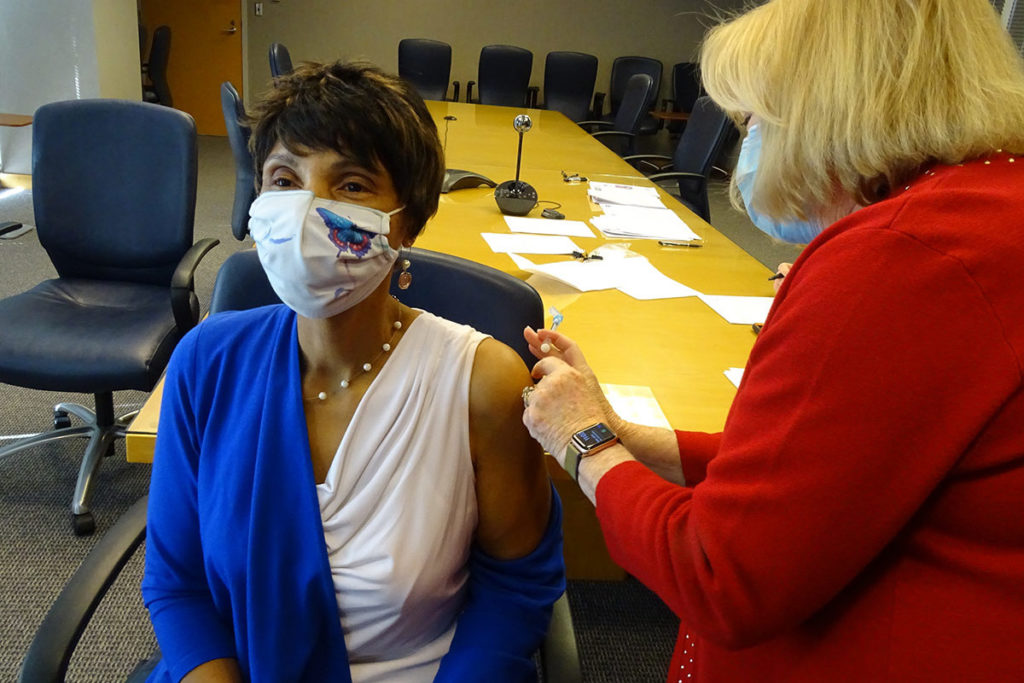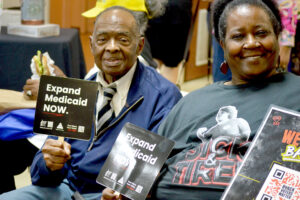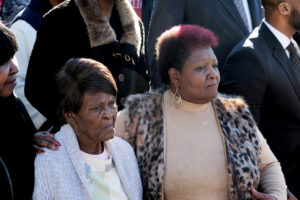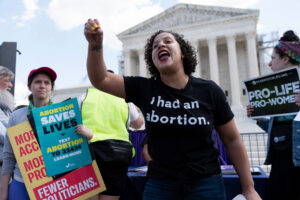Almost 500 unfilled slots for COVID-19 vaccine appointments remained available for today by Sunday evening along with 400 unfilled openings for Tuesday. Mississippi Gov. Tate Reeves used social media yesterday to appeal to residents to sign up for an appointment at covidvaccine.UMC.edu.
“And share with someone you love—especially if near Jones, Pike or Neshoba Co! We want to help as many people as we can, as quickly as possible,” the governor tweeted.
Mississippi State Health Officer Dr. Thomas Dobbs also said today that a “significant” number of appointments remain available this week in Forrest, Jones, Jackson, Lafayette, Lauderdale, Lowndes and Washington counties.
Anyone who is age 75 or older, all health-care personnel and residents of long-term care facilities are currently eligible to get the vaccine.
So far, health workers have administered 55,399 doses of the vaccine to Mississippians—about one-fifth of the 249,000 vaccines that the Mississippi State Department of Health reports have distributed to hospitals, private clinics, pharmacies and MSDH’s own drive-thru clinics.
Both vaccines currently available, the Pfizer and Moderna vaccines, require two doses by injection three to four weeks apart.
So far, MSDH data show that white Mississippians account for 64% of all vaccinations, while Black Mississippians make up just 16% of those who have received at least one dose despite making up about 38% of the state population. Asian Mississippians currently make up 2% of all vaccinations and 1% of those who have received a dose identified as Hispanic.
Since the early groups of vaccine recipients skewed more white than the population as a whole, though, those statistics will likely change as more Mississippians gain access to vaccination.
MSDH has a list of clinics statewide that are now vaccinating patients.
‘I Have Tremendous Optimism for This Vaccine’
Forrest General Hospital and the Hattiesburg Clinic opened the HealthWorks Immunization Clinic today to focus on vaccine delivery. The two health systems first partnered last March as COVID-19 pandemic arrived in the Magnolia State to open a Cough & Fever Clinic for people with possible COVID-19 symptoms.
“The success of the Cough & Fever Clinic showed that by working together as partners, we can continue to create innovative processes to serve our communities,” Forrest Health CEO Andy Woodard said in an announcement on Jan. 8. “Providing easy access to the vaccine will allow more people to get vaccinated and assist in bringing the COVID-19 illness under control for our state and nation.”
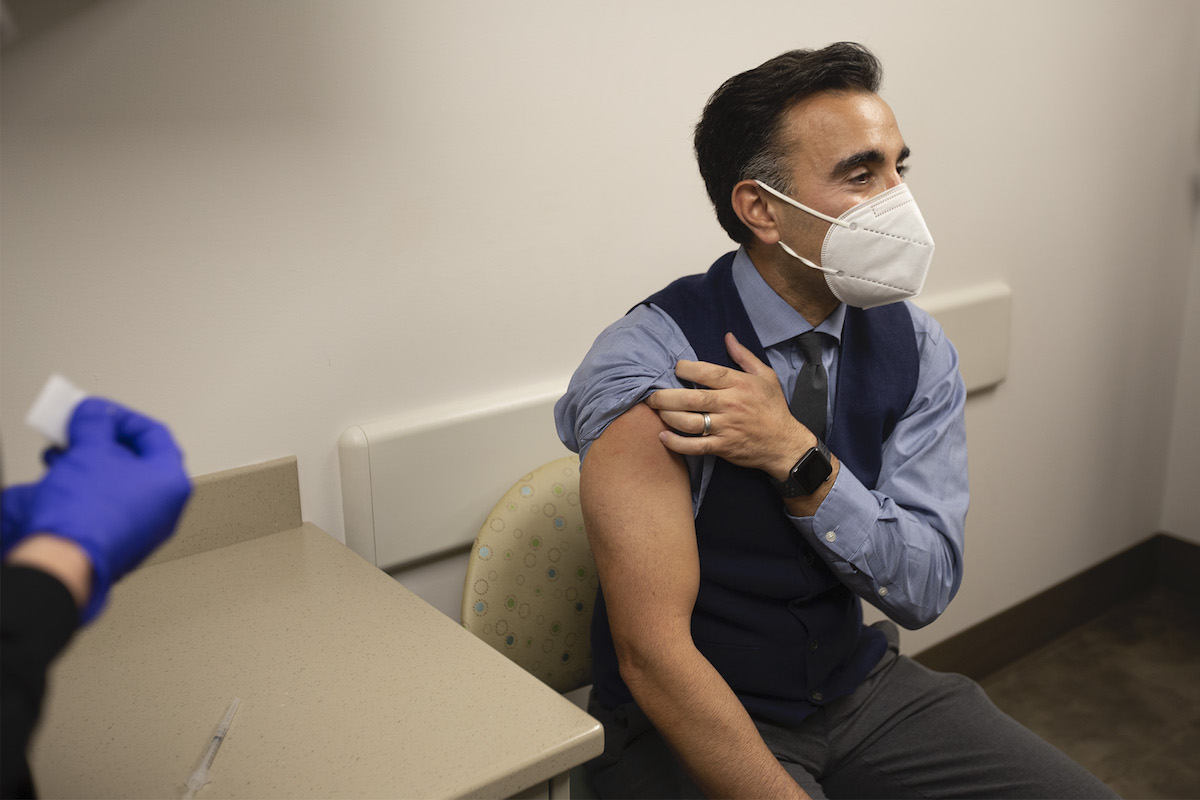
The new clinic, located on the first floor of the Hattiesburg Clinic building, began accepting appointments by phone today at 601)-261-1620.
Last year, the Hattiesburg Clinic’s Medisync Clinical Research laboratory was the only clinical trial site in the state for the COVID-19 vaccine.
“I have tremendous optimism for this vaccine, not only because it is incredibly effective, but the science is elegant, clean and the likely template for all future vaccines,” Dr. Rambod A. Rouhbakhsh, who served as the principal investigator for the trial, said in a statement with Forrest Health on Jan. 8.
‘We’ve Hit a Lot of Sad Milestones’
Despite the slowly growing vaccine availability, k, Dr. Dobbs, the state health officer, warned at a press conference with the Mississippi State Medical Association last week that the COVID-19 pandemic is far from over.
“We’ve hit a lot of sad milestones. Record cases, record deaths. The obituaries are taking up a large percentage of the newspapers,” Dobbs said. “I may lose someone I’m close to pretty soon to COVID. It didn’t have to happen. It makes me so mad. Almost all of these deaths we are having right now are not necessary. It’s not necessary. Hospitals are overburdened, and we’re going to see a lot more people hospitalized.”
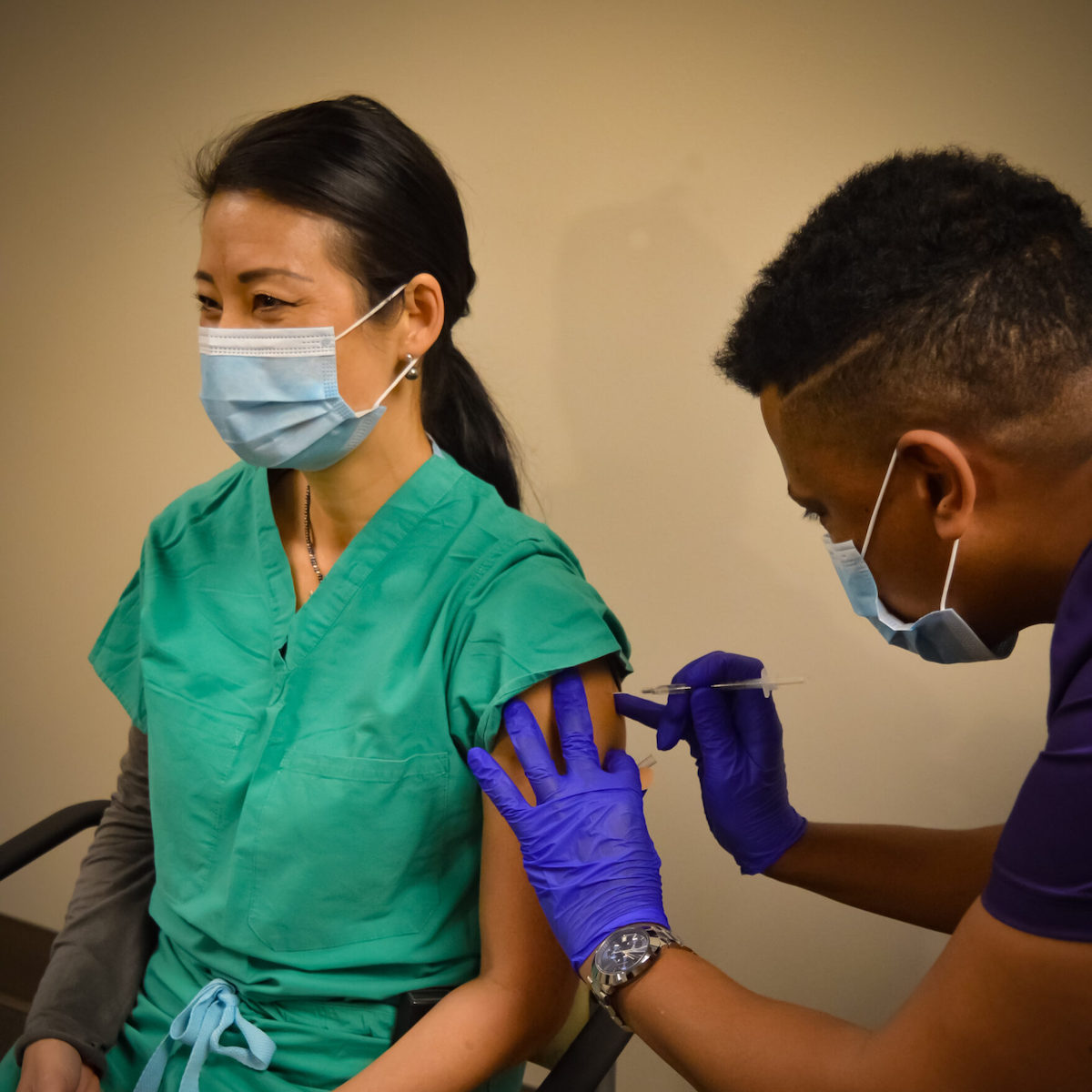
Confirmed COVID-19 deaths in Mississippi officially passed the 5,000 marker last week, but Dobbs warned that the real death toll is likely significantly higher due to MSDH’s “conservative” approach to counting pandemic deaths.
That fact only adds to his frustration when people spread false claims that MSDH is “inflating” the death toll by counting deaths from other causes, such as heart attacks, as COVID-19 deaths because the deceased also tested positive for the virus.
“A lot of the denial is to exploit this. People don’t get up here and do gyrations about, ‘Did they really die with the heart attack?’ Or, ‘You’re inflating the numbers, Mark, every time you inflate the heart attack numbers by saying they died with toe fungus but also had myocardial infarction,’” he said, turning to MSMA President Dr. Mark Horne.
“This is more conspiratorial bunk. If someone shoots you in the liver, and you bleed to death from the liver, is it liver failure that killed you or the bullet? It doesn’t mean you died ‘with bullet, not from bullet.’”
Conspiracies surrounding the vaccine are also complicating public health officials’ efforts to help bring the pandemic to an end this year.
Up to 47% of Mississippians Say They May Not Get Vaccinated
In a Jan. 5 Millsaps-Chism Strategies State of the State Poll, a 53% majority of Mississippians said they will “likely” get the COVID-19 vaccine when it is available, but 34% said they may not and 13% said they were not sure.
Among age groups, 58% of those 65 and older said they “definitely will get vaccinated,” and another 18% said they will “probably” get vaccinated. Among 18 to 34 year olds, the youngest age group surveyed, 39% said they would “definitely” or “probably” get vaccinated. The group least likely to say they would take the vaccine was 35- to 44-year-olds, among whom only 19% “definitely” planned to get the vaccine, while 12% said they would “probably” get it.
Among all groups, men were significantly more likely to say they would get the vaccine than women, with 60% of men saying “definitely” or “probably” compared to only 47% of women.
Interest in the vaccine varied regionally. In the 3rd Congressional District in central and eastern Mississippi, 62% of residents said they would likely get the vaccine, with 51% saying they would “definitely” take it.
One Mississippi lawmaker there, Rep. Tom Miles, has encouraged constituents to take the vaccine. Last May, he revealed that his mother, nurse Sheena Miles, had died after contracting COVID-19 while working on the frontlines of the pandemic.
“As a nurse who spent her last working days trying to help those who had this terrible virus, my mother knew all too well the effort and energy her caregivers were providing her, and she appreciated their help so much,” Miles said in a Facebook post last May. “I think she would want me to say that all our healthcare front-line workers are the heroes in this pandemic. She appreciated you all so much, and she was so proud to be one of your special number.”
After the Pfizer vaccine received approval last month, the Scott County lawmaker issued a statement hailing its arrival.
“As someone who lost my mother, a front line emergency room nurse, and other close friends from Covid, and as an elected official, I will lead by example and take the coronavirus shot as soon as it is made available to the public,” Miles said on Dec. 10. “One of my friends who recently recovered put it best when he said that he knew how bad sick he was and had seen so many friends bad sick—and some who even passed away—that he would definitely take the shot because he never wanted to go through it again. I encourage and challenge all elected officials across the State to take the shot when the first vaccine is made available to the public. It’s called leading by example. I’m in and hope others will join along with me and putting the end to this pandemic.”
Half as many, or about 26%, said they will “definitely” get the vaccine in Mississippi’s 1st Congressional District in the north part of the state, though. That includes DeSoto County, where local leaders and state representatives have pushed COVID-19 conspiracy theories, discouraged mask use and, in some cases, discouraged residents from taking the vaccine.
Mississippi House Rep. Dan Eubanks, a member of the Mississippi House Public Health and Human Services Committee, has used social media to sow doubts about the vaccine. In a Nov. 9 Facebook post, he mocked the Pfizer vaccine’s announcement, implying the company waited until after Joe Biden won the presidential election to deny Donald Trump credit.
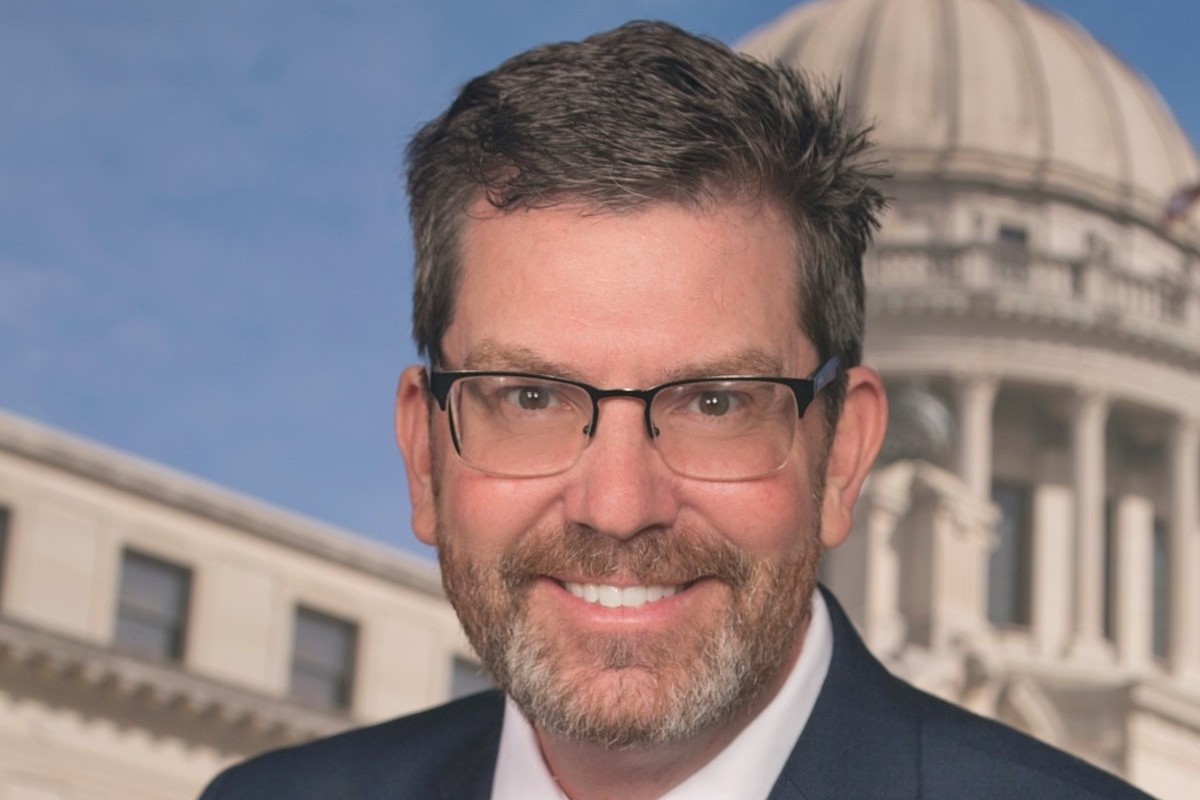
In a comment, a constituent wrote, “Well, I don’t care how effective it is. I am NOT taking it and neither is my family.”
“Neither is mine,” Eubanks replied.
Among those in Mississippi’s 2nd Congressional District in the Delta, 54% said they would “definitely” or “probably” take the vaccine, along with 56% in the 4th Congressional District in South Mississippi.
Statewide, about 53% of both Black and white Mississippians said they would either “definitely” or “probably” take the vaccine. Despite mistrust of the medical field among Black Mississippians due to historic injustices, white Mississippians were far more likely to say they “probably” or “definitely” would not take the vaccine, with 37% saying that compared to just 26% of African Americans.
Dr. Dobbs has said repeatedly in recent months that Black Mississippians exhibited higher levels of compliance with pandemic-era public health guidelines than white Mississippians, and white Mississippians continue to make up a higher percentage of new cases and deaths. That is a reversal from the early months of the pandemic that hit Black and indigenous Mississippians hardest.
Hispanic or Latino Mississippians overwhelmingly said they “definitely” planned to take the vaccine, with 88.5% saying that and the remaining 11.5% saying they would “probably” get vaccinated. A higher share of Asian Mississippians, 61%, said the same.
Dr. Dobbs ‘Disappointed in the American Spirit’
During the Jan. 8 press conference, Dr. Dobbs said he was also disappointed by what he sees as Americans’ acquiescence to the virus.
“There’s this defeatist attitude that everybody’s going to get it anyway. That’s not true. I’m so disappointed in the American spirit that you would just give up and roll over and let COVID destroy your life and your loved ones for no good reason,” the state health officer said.
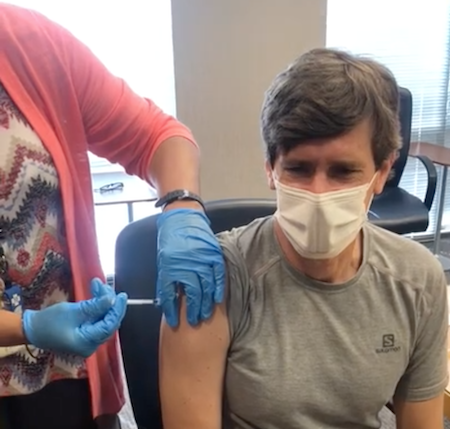
“We have a vaccine. We have American willpower. We have American ingenuity—the great things that we have done. And we would be so weak to give up now. It’s so discouraging to see our fellow Americans just not have the insight or the bravery to be patient.”
As the virus ravages hospitals and hundreds more die each week, Dr. Dobbs said he does not believe Mississippians are willing to make temporary sacrifices as the state did when the pandemic first arrived last March, or such as the United Kingdom is doing right now.
The U.K. re-entered a shutdown phase last week to control the spread of a new, more contagious, but no more lethal, strain of the coronavirus. That strain has since reached the U.S., though Dobbs said MSDH has not detected it in the state.
“We are unwilling to shut down, and it’s going to be ugly. Is the new strain in Mississippi? Probably. Is it widespread here? Probably not,” he said.
Dr. Horne urged Mississippians to remember that the health-care system is already overloaded.
“Our hospitals are full. Our ERs are full. Even smaller hospitals are holding multiple ICU patients on ventilators in the ER for days. It’s real. It’s not just affecting COVID patients—it’s affecting other people who need medical care,” he said. “So please, please, we need your help. We’re doing everything we can. We need you to do everything to help us.
“And we will get on the other side. We’ll be ok, but let’s take as many people as we can with us. Let’s save as many people as we can.


